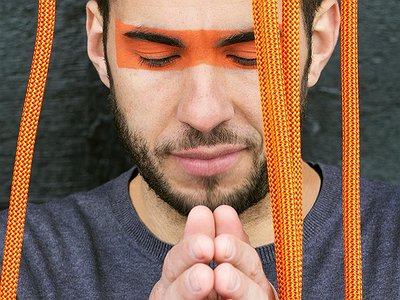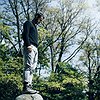Part 1
Name: Manu Delago
Nationality: Austrian
Occupation: Hang player, percussionist, composer
Current Release: Parasol Peak on One Little Indian
Recommendations: I apologise if this piece is too famous but I think everyone should listen to Igor Stravinsky's 'Rite of Spring'. I grew up listening to rock and pop music, and later jazz, hiphop and electronic music but the 'Rite of Spring' opened the world of orchestra to me, and is in my opinion one of the greatest pieces ever written.
The second suggestion is selfishly 'Parasol Peak'. My new film and album is an Alpine Sound Expedition, a challenging project of seven musicians climbing through the Alps and recording music at surreal locations. It's a back-to-the-roots-project that simultaneously feels very contemporary and unique. I'm very proud of the ensemble and crew and hope that many people will join us on the journey.
Website / Contact: If you enjoyed this interview with Manu Delago, visit his website and/or facebook page.
When did you start writing/producing music - and what or who were your early passions and influences? What what is about music and/or sound that drew you to it?
Even as a child, when learning the accordion, I preferred improvising over playing sheet music. I made up my own little pieces. As a teenager I played in rockbands and we wrote our own songs, inspired by artists like Rage against The Machine, Red Hot Chili Peppers or The Deftones. Playing music was my favourite thing to do and without noticing it turned into my job, already in my final high school years. Of course over the years my taste developed and my listening horizon got much bigger.
For most artists, originality is first preceded by a phase of learning and, often, emulating others. What was this like for you? How would you describe your own development as an artist and the transition towards your own voice? What is the the relationship between copying, learning and your own creativity?
Yes, totally. With my very first bands we played a lot of covers. Also when I was playing the drums at home, I played along to my favourite songs and tried to copy the drums as precisely as possible. I also went through a music university system and studied classical percussion as my undergraduate subject, and jazz drums for my masters. I think trying to learn different styles helps a lot finding your own voice. I was also very lucky that I came across the handpan in 2003. The instrument was very new then and I had no other choice than developing my own style. I just tried to use all my knowledge from playing the drums, and also the musical knowledge I had from my accordion, piano and marimba years.
What were your main compositional- and production-challenges in the beginning and how have they changed over time?
The less experience you have, the harder it is to imagine a big picture in your head. When I started out, I just brought little ideas to my fellow musicians and we developed the music together. When I was younger, my bandmates seemed to have more time for trial and error. Once musicians turn into professionals, they travel more and often have families. Everyone's time gets very limited and you have to prepare more in advance and really know what you want. One mistake I made a lot in the early days of composing music was that I put too many ideas into one piece. Often one single idea is enough, you just have to develop it.
What was your first studio like? How and for what reasons has your set-up evolved over the years and what are currently some of the most important pieces of gear for you?
The first recording device I used, was a mini-disc player with an external microphone. With that I recorded lots of band rehearsals and then also did some very basic editing. Obviously my equipment has changed, but since I live in London and travel a lot, I still try to keep things small. In my flat I have a tiny RME interface and a couple of nice mics. I've recorded many tracks in my flat but if I need a proper recording studio, I usually go elsewhere. The most important pieces are still real instruments though, in my case lots of percussion and handpans.
How do you make use of technology? In terms of the feedback mechanism between technology and creativity, what do humans excel at, what do machines excel at?
I go through different phases with technology. With my new release 'Parasol Peak' I made a decision to record in the mountains and not use any technology at all (except battery powered film and audio recording equipment). But on my previous album 'Metromonk' I focussed on electronic manipulation of the handpan. I mainly worked and programmed inside Ableton Live, so that I didn't need too much gear in addition to my acoustic instruments. So I basically built Ableton sessions that create quirky sounds, but ultimately still played my handpans live to give the electronics a human feel. I'm a fan of 'performing' music by which I mean that I physically play instruments when I'm on stage. If the music was purely computer-made, it wouldn't have my soul in it.
Production tools, from instruments to complex software environments, contribute to the compositional process. How does this manifest itself in your work? Can you describe the co-authorship between yourself and your tools?
I come from an acoustic instruments background, so in most cases I start a compositional process by playing an instrument. The computer helps me to record and manipulate the source sound. But sometimes, often through accidents, I discover something through the software and get inspired by the computer.
Collaborations can take on many forms. What role do they play in your approach and what are your preferred ways of engaging with other creatives through, for example, file sharing, jamming or just talking about ideas?
In my early days of making music, I used to jam with other musicians way more than I do now. It's a shame because it's very inspiring and a fun way of practising an instrument. The reality these days is a lot of file sharing through the internet. I have some musical partners where that works really well, it's got its own chemistry. But in many cases I wish I could play or record together in the same room and bounce ideas off each other. But overall, I've been lucky to collaborate with some amazing artists, and learned so much from them for which I'm very grateful.






